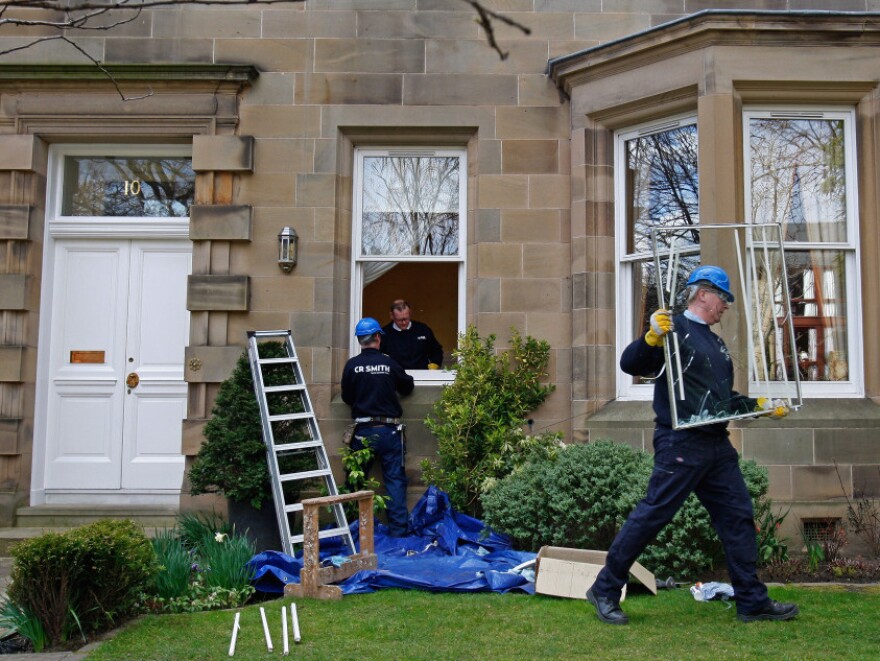Until recently, the former head of the Royal Bank of Scotland was known as Sir Fred Goodwin. Now, he's plain old Fred. Goodwin has been stripped of his knighthood because of the prominent role he played in RBS' near-failure. But not all Britons are happy.
A couple of years ago, Goodwin could do no wrong. He had turned RBS into one of the biggest banks in the world. Known as "Fred the Shred" because of his ruthless cost-cutting, Goodwin was immensely rich, beloved by investors, and at home, a knight of the realm, a title he received in 2004.
Then, everything went wrong. In 2007, Goodwin led RBS into a catastrophic takeover. The credit crunch steamrollered in, and RBS teetered.
British taxpayers were hit for a $70 billion bailout in 2008, and Goodwin headed for the door, with a pension paying well over $1 million a year. That pension particularly enraged the public.
He reluctantly agreed to half — but only after a big fight that made him deeply unpopular. "Fred the Shred" became a byword for the greed and folly of all fat-cat bankers. People began throwing rocks at his home.
Goodwin was never convicted of a crime. Yet he is now being punished in a peculiarly British fashion.
Queens and Kings of England have handed out knighthoods since medieval times. Very rarely do they take them back — one example of this happening is the case of Anthony Blunt, member of the Cambridge spy ring. And the decision to "cancel and annul" Goodwin's knighthood has aroused strong and conflicting emotions across the kingdom.
There was plenty of applause from the public. But there was also a lot of criticism. A lead editorial in The Independent newspaper proclaimed the move "crass, childish and wholly counter-productive." It compared the decision with a "mob baying for vengeance."
Simon Walker, head of the Institute of Directors, calls it "an attack on business."
"I am concerned about an anti-business hysteria about the whole situation. I don't approve of the decision to strip Fred Goodwin of his knighthood," Walker says. "I don't think it is a business issue, I think it is an honors system issue."
John Mann, a parliamentarian with Britain's opposition Labour Party, thinks singling out Goodwin gives a misleading impression about what caused the financial crisis.

"I think the danger with it is that there is a presumption then that there was a rogue banker, and that it was just one man who was getting things wrong, calling it wrong, and not acting particularly ethically," Mann says. "In fact, it was many bankers, including the whole board of the Royal Bank of Scotland."
The decision to remove Goodwin's title was taken by what's called the Honors Forfeiture Committee, a body of senior civil servants, and approved by Queen Elizabeth II.
The committee made its decision based on the fact that Goodwin was knighted for services to banking. However, the near-collapse of RBS — in which Goodwin was the chief villain — was a disservice to banking, the committee's logic went. In this exceptional case, the committee concluded, the title must be removed to protect the ancient British honors system from disrepute.
But in the eyes of many, the system is already in disrepute. Knighthoods and other honors are intended to reward great achievement and service. Many British say they are often deserved — but not always.
Some titles are automatic — for example, for achieving a senior post in the army or civil service. But over the years, government after government has handed out titles as rewards for political favors.
And a surprising number of crooks have remained lords and knights after their crimes have been exposed. Author Jeffery Archer went to prison for perjury. He still sits in Britain's unelected House of Lords — as do a couple of lords who've done time for padding expenses and another, jailed for setting fire to a hotel's curtains.
Copyright 2023 NPR. To see more, visit https://www.npr.org.




